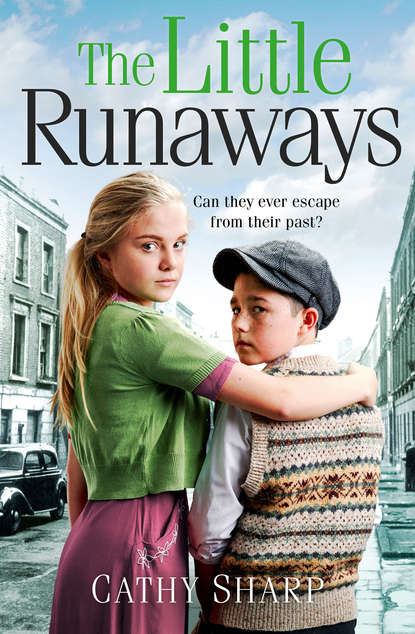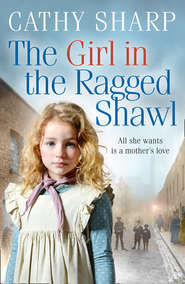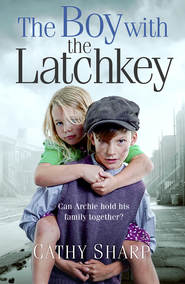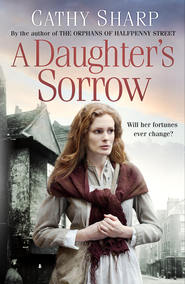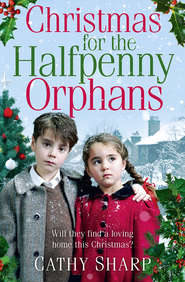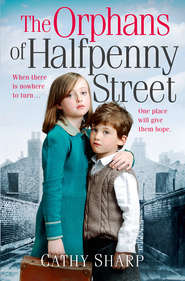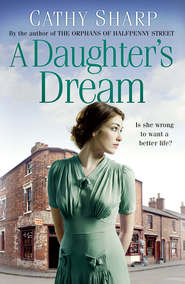По всем вопросам обращайтесь на: info@litportal.ru
(©) 2003-2024.
✖
The Little Runaways
Настройки чтения
Размер шрифта
Высота строк
Поля
If she’d known she would have taken the meat cleaver to him!
Tears stung her eyes as she looked at the writing on the envelope. She didn’t recognise it, although it had come from that village down there in Cornwall. It hadn’t been written by her daughter, she knew that much.
Tearing the envelope open, she saw that her last letter to Maisie had once again been returned unopened. Slumping down at the kitchen table, Nan bent her head and wept. How could Maisie do this to her time and again? She was supposed to have devoted her life to God and was bent on becoming a nun and yet she didn’t care about the pain she inflicted on her own mother.
There was a brief note of regret from the Mother Superior and that was all. Sister Mary, as she was called these days, did not wish to receive letters from her mother just yet, but she would be informed if there should be a change …
Angry with her daughter and with herself for caring, Nan threw the letters into the fire. She looked at the precious photos in the frames she’d bought as and when she could afford them; they took up a whole shelf of the old oak dresser she’d purchased when she came to live here. There was only one of Maisie – after it all happened, looking pale and withdrawn, so different from the happy, pretty child she’d been when her father and adored brother were still alive.
Maisie had been Archie’s twin, and the change in her had started after he died, because she’d kept asking why she was alive and her twin was dead of the typhoid. Nan hadn’t been able to answer that, any more than she could explain what had happened between them – why she’d drifted away from her daughter, why she hadn’t seen what was happening, hadn’t realised what that filthy beast had on his mind.
No, she wasn’t going to let her thoughts drift in that direction. It was madness to dwell on whether she’d been at fault, as Maisie had claimed that day when she’d told her mother she was retiring to a convent to give her life to God.
‘You must have known what he was,’ Maisie had said calmly in a voice of ice. ‘How could you not have seen what was happening – the way he looked at me …?’
‘I was too busy, too tired.’ Nan had tried to explain that she had thought her lodger wanted to get her into bed rather than her twelve-year-old daughter. Yet she knew that however many times she apologised, however many times she begged Maisie to forgive her, she could never take away the horror of her daughter’s suffering at the hands of that beast.
Maisie had run away and it had taken months of searching before Nan found her living rough. She’d never known what had happened in those intervening days and weeks, because her daughter refused to speak for years. All the doctors she’d taken her to had been baffled, expounding all kinds of theories, but they’d all been wrong. Maisie had simply refused to speak until she was ready – until she’d made up her mind to leave her home for good.
It was all Nan’s fault, because she hadn’t looked after the girl; she hadn’t noticed what was happening under her nose, and for that she was to be punished for the rest of her life, it seemed.
Nan’s throat swelled with emotion, choking her, but she fought down the anger and the self-pity, refusing to give way.
She couldn’t let the past haunt her because Maisie had returned her letter again, and she wouldn’t, Nan decided. She’d been so happy while Sam lived but these past seven years had been nothing but grief – or they would have been had it not been for the friendship she’d formed with Beatrice.
Beatrice had suffered enough herself, though she never spoke of it to anyone, as far as Nan knew. Her secret remained locked inside her, and she had never revealed the whole of it even to Nan. Their friendship was strong and they’d grown closer over the years, especially since Beatrice had joined the staff at St Saviour’s. They’d met when Beatrice was ill in the Infirmary years before and Nan had been one of the cleaners on the ward. That was before Beatrice had decided to become a nun and take up nursing. Nan remembered taking her cups of tea and sitting on the edge of her bed talking to her until one of the nurses asked her what she was doing. Even then she hadn’t talked about what had made her so ill or why she’d decided to enter a convent, though Nan knew it was a personal tragedy that had brought her so low.
Sighing, Nan took out a clean handkerchief and wiped her eyes and then blew her nose. This wouldn’t buy the baby a new coat! The old saying made her smile, reminding her of her grandmother and happier times. They’d been really poor in those days, but everyone seemed more content, at least that was the way she remembered things. It was ridiculous to feel sorry for herself when there were so many worse off than she was; so many war widows and orphans. Nan was lucky to have this new home, a job at St Saviour’s that she loved and several good friends – a reluctant smile touched her lips as she thought of one of her newer friends. She liked Angela a great deal, and she had something to ask her …
Getting up, Nan pulled on her rather shabby grey coat, set a little blue felt cloche on her head and picked up her gloves and handbag. She must be getting back to St Saviour’s, because she knew that two of the kitchen staff were down with sore throats again, and Cook would be shorthanded. Besides her own work with the children, she would have to lend a hand with the fetching and carrying. Not that she minded what she did, and she had a scheme that might give her something to think about and stop her fretting about Maisie.
Going out into the morning air, she discovered it was colder again, a light dusting of snow on the ground, and she pulled her coat collar up around her throat. The weather had been bitter ever since the turn of the year, the coldest winter Nan could recall, and the snow had caused endless problems in many parts of the country. It was never quite as bad in London, because the traffic soon cleared much of the slush and ice away, but they’d had another power cut the previous evening. Nan was fortunate to have the stove, which kept her warm. She’d bought in a good store of coke and coal before Christmas, but she knew that some people were running short, especially those who could only afford to buy in small amounts. The last thing Nan wanted was to get ill again. She’d had a touch of flu late last year and she didn’t want another chill just yet.
Her bus was drawing up as she reached the stop and the conductor gave her a cheery smile as she climbed on board and found her seat. He was usually on the run to her stop just outside St Saviour’s and it was like meeting a friend every morning.
‘Usual fare, love?’ he asked, churning his machine without waiting for her answer and handing her the ticket. ‘Bit nippy out, ain’t it?’
‘Yes, very cold,’ Nan said, smiling at the understatement. ‘How is your wife getting on, Ned? Still got that nasty cough?’
‘She’s about the same, but she won’t go to the doctor’s,’ he said and winked. ‘Says a drop of brandy will set her straight and mebbe she’s right.’
He moved off down the bus as it drew into the next stop and a man in a grey coat and black trilby got on. He was carrying a newspaper, some worn leather gloves, and a brown paper parcel tied up with string; he dropped the parcel as he reached the seat where Nan was sitting. The conductor retrieved it for him and he struggled to tip his hat to Nan, dropping his paper on the seat in the process. She moved along to give him room.
‘All right if I sit here, ma’am?’ She thought his accent sounded a bit northern but wasn’t sure, because it wasn’t pronounced.
‘Yes, of course. I’ve got four stops to go yet.’
The man sat down and handed his fare to the conductor, then hunted for his newspaper. Nan wriggled it out from beneath him and he chuckled, his eyes sparkling with merriment. He must be in his early sixties, Nan thought, but attractive with it and clearly good-natured.
‘I should lose my head if it wasn’t stuck on,’ he confessed. ‘I always start off with half a dozen things and end up with most of them left on the bus or train.’
‘That must be awkward?’
‘They know me well at lost property,’ he said cheerfully. ‘I usually get everything back, though the newspaper doesn’t get handed in very often.’
‘I expect people think it has been abandoned and take it home.’
‘Very likely. I hope I haven’t forgotten anything important today. I’m delivering this parcel and I’d hate to lose it. It’s part of the job I started last week, see. Work is hard enough to come by for a man like me.’
‘Yes, that would be awkward,’ Nan said, and laughed. ‘My name is Nan. I work at St Saviour’s – it’s a home for children in need …’
‘Yes, I’ve heard of it,’ he said, and offered his gloved hand. ‘I believe it’s run by Sister Beatrice – a friend of mine says she’s a marvel.’
‘Yes, Beatrice is wonderful with children. She is strict, because she has to be, but underneath she loves them all, as I do.’
‘What do you do there? Are you a nurse too?’
‘No, I’ve never had any training, but I had a family – and I help to look after the children. I suppose I’m the head carer. I just pick up the pieces and look after anything that needs doing, for the children, but also for everyone else. I do whatever I can to help, you see – and sometimes that is just a matter of a little tea and sympathy.’
‘Ah yes, I’m a great believer in tea and sympathy,’ he said. ‘Army life depends on it, you know. I was with the medics during the first war, just an orderly, running around fetching stuff for the doctors, and sorting out the men’s problems in me spare time. This time round I helped out at a care home; a biscuit and little drink of tea in my room helped to break down their reserve sometimes. Poor young devils; they’ll suffer for that damned war for the rest of their lives.’
‘Are you still in the Army?’
‘No, they threw me out after the Armistice; too old, they tell me,’ he said, and his eyes twinkled again. ‘I am lucky enough to have found myself a little job delivering books to the college. I’ve been taken on by a professor at the University. Nice chap, doesn’t ask much. I fetch his shopping, mostly cakes for the teas he gives his students. Like I said, a cup of tea makes the world go round and I enjoy meeting the lads. Decent bunch but a little mad at times.’
Nan laughed, because he was an old soldier, a bit like her Sam had been; he made her feel comfortable and she knew he must get on well with his employer and the students. He seemed an amiable, fatherly sort of man whom everyone could trust and rely on.
‘I expect they are just grateful that they didn’t have to fight that awful war.’
‘The lost generation,’ he said, and the smile left his eyes. ‘So many friends were killed in the Great War, though I came through it almost unscathed, but this time it was my friends’ sons … they deserted their education and their jobs to fight for King and Country and too many didn’t come back.’
‘Yes, it is so sad, but wars always are,’ Nan said. ‘Well, it was nice talking to you, but the next stop is mine.’
‘Ah, then I must let you escape.’ He got up, his parcel sliding to the floor. Nan squeezed out into the aisle and then picked up his parcel, handing it to him as he sat down. ‘Goodbye, Nan. I enjoyed our chat.’
Nan smiled. He hadn’t told her his name but he probably didn’t realise that.
‘So did I,’ she said. ‘I hope you don’t lose anything …’
He murmured something but Nan was moving down the bus ready to get off at the next stop. Something made her look back before she stepped down, and he lifted his hat to her.
Nan smiled inwardly as she started the short walk to St Saviour’s. It was funny how often you met pleasant people on a bus and fell into conversation, yet you probably never saw them again. She wouldn’t mind travelling with the old soldier more often, but doubted if it would happen.
One thing, he’d cheered her up. She no longer felt so distressed by that letter. After all, Maisie was old enough to know her own mind and she would have to decide for herself if the future she’d chosen was what she truly wanted.
EIGHT (#ulink_9ddca5ee-c04d-51d0-84ee-7ce00316ac5d)
‘Are you sure you can part with them?’ Sally asked that Monday evening as she tried on the beautiful gown in Angela’s apartment. It was a delicious powder-blue satin with thin straps and a low back, and then there were two gorgeous fine wool dresses that were simple in design and suitable for an informal evening out or lunch at a nice hotel. This was the second time she’d tried on Angela’s clothes; she’d borrowed a smart grey dress when Andrew took her to the theatre the previous week. Sally had returned it nicely sponged and pressed, but now Angela had offered to give her these. ‘I’ve never worn anything like this, Angela. The material is wonderful and the styling – I only meant to borrow something now and then and I ought not to take them …’ She looked a little embarrassed.





